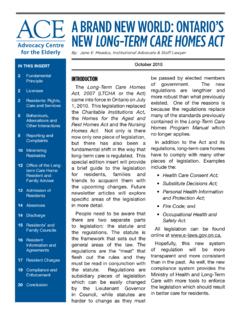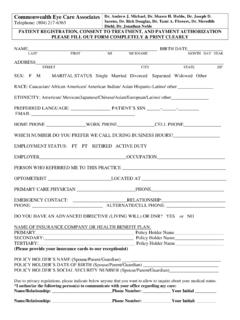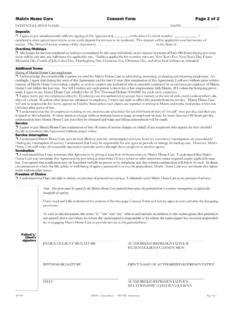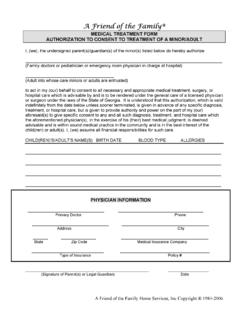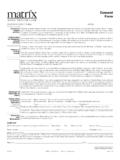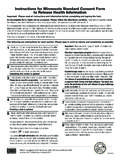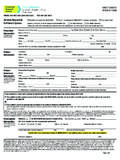Transcription of Tip Sheet # 2 HIERARCHY of Substitute Decision …
1 ACE Tip Sheep #2 HIERARCHY of SDMs in the HCCA September 2013 2 Carlton Street, Suite 701 Toronto, Ontario M5B 1J3 Tel: (416) 598-2656 Fax: (416) 598-7924 Tip Sheet # 2 HIERARCHY of Substitute Decision Makers (SDMs) in the Health care consent Act Requirement for an Informed Consent1 Before providing any treatment to a Patient, HEALTH PRACTITIONERS2 have the legal and ethical duty to obtain INFORMED CONSENT3 from a Patient, if the Patient is MENTALLY CAPABLE to make the Decision about the particular treatment being offered4. The Health Practitioner proposing the treatment to the Patient is responsible for determining whether the patient is mentally capable to consent to the treatment offered5.
2 If a Plan of Treatment6 is proposed to the Patient, one Health Practitioner on behalf of all the Health Practitioners involved in the plan, may determine the Patient s capacity with respect to the treatments referred to in the plan7. If the Health Practitioner is of the opinion that the Patient is not mentally capable to consent to the particular treatment8, then the Health Practitioner must turn to the Patient s Substitute Decision MAKER (SDM) who gives or refuses the informed consent on behalf of the Patient. In an EMERGENCY, if the patient is incapable or unable to communicate with the health practitioner and a delay to obtain informed consent would put the Patient at risk9, Health Practitioners do not need consent in order to treat but they must follow any known WISHES of the Patient in respect to treatment.
3 Health Practitioners may also encourage Patients to Advance care Plan which is done by confirming or choosing a future SDM and communicating any wishes about future care and the Patient s values, beliefs, and approach to quality of life to the Patient s future SDM. Who is a Patient s Substitute Decision Maker for Health care ? Patients need to know who is their future SDM A Patient needs to understand who would be his/her Substitute Decision Maker for Health care if he/she became mentally incapable to make health decisions. Every Patient in Ontario AUTOMATICALLY has a person who will have legal authority to act as his/her SDM if they become incapable Chair, Board of Directors Timothy M.
4 Banks Lawyers Judith A. Wahl, , Rita A. Chrolavicius, Graham Webb, , Jane E. Meadus, , Brendan Gray, , ACE Tip Sheep #2 HIERARCHY of SDMs in the HCCA September 2013 2 The Health care consent Act states that a Patient s SDM will be the person or persons who are highest ranking on the HIERARCHY of SDMs listed in that legislation who meet the REQUIREMENTS to be an SDM A Patient may Advance care Plan and may express wishes about future care10 and may decide who he/she may want as his/her future SDM. This is done either by: o the Patient confirming that he or she knows who is his/her automatic future Substitute Decision Maker in the HIERARCHY list11 that is in the Health care consent Act and that he or she is satisfied that that person should so act as SDM when the Patient is incapable OR o the Patient choosing someone else to act as SDM by preparing a Power of Attorney for Personal Care12.
5 This can include persons who would otherwise be on the HIERARCHY or those who are not, as long as they meet the requirements of an Attorney set out in the Substitute Decisions Act. To appoint someone as an Attorney, the Patient must sign a POAPC document that meets the legal requirements 13and cannot just orally appoint someone to be his or her Attorney Why Health Practitioners need to know who is the Patient s SDM? Health Practitioners need to know who is the Patient s SDM because Health Practitioners must get an informed consent before providing care to Patients, except in an emergency That consent must come from the patient, if mentally capable with respect to the particular treatment proposed, or from the Patient s SDM if the Health Practitioner determines that the Patient is not mentally capable to provide consent .
6 The HIERARCHY of SDMs in the Health care consent Act The HIERARCHY The following is the HIERARCHY of SDMs in the Health care consent Act, : 1. Guardian of the Person with authority for Health Decisions 2. Attorney for personal care with authority for Health Decisions 3. Representative appointed by the consent and Capacity Board 4. Spouse or partner 5. Child or Parent or CAS (person with right of custody) 6. Parent with right of access 7. Brother or sister 8. Any other relative 9. Office of the Public Guardian and Trustee ACE Tip Sheep #2 HIERARCHY of SDMs in the HCCA September 2013 3 How to Use the HIERARCHY Health Practitioners should start at the top of the HIERARCHY and work their way down, making inquiries to ensure they are speaking with the right person or persons.
7 A Patient s SDM is the person or persons in that particular Patient s life who are the highest ranking in the HIERARCHY that meet the requirements (as set out below) to act as SDM. If the highest ranking person in the Patient s life does not meet the requirements, the Health Practitioner must turn to the NEXT highest ranking SDM that meets the requirements Even if a person is highest ranking, he/ she may refuse to act as SDM for the Patient. If that happens, then the Health Practitioner may turn to the next highest ranking SDM that meets the requirements. If there is more that one person at any level in the HIERARCHY who meet the requirements to be SDM, then all those people are entitled to act as SDM for the Patient.
8 They may all decide together or they may decide amongst themselves as to which of them will act as the SDM. The Health Practitioner cannot choose which of the equal ranking SDMs may act A Patient, if incapable, ALWAYS has an SDM even if he or she hasn t prepared a POAPC and doesn t have any family to act as SDM. The Public Guardian and Trustee is the Patient s SDM if there is no one higher on the HIERARCHY list that meets the requirements to be SDM. Documents that purport to override this default to the PGT as last resort Substitute Decision maker are neither valid nor legally enforceable. If equal ranking SDMs cannot agree on a Decision for the Patient, the Health Practitioner must turn to the Public Guardian and Trustee (PGT) for the Decision for the Patient and the PGT 14 is required to make this Decision .
9 REQUIREMENTS for the SDM - HCCA The SDM in the list may give or refuse consent for treatment, admission to a long-term care facility, or personal assistance services in a long-term care facility only if he or she is: i) capable with respect to treatment proposed, ii) 16 years old, unless he or she is the parent of the incapable person, iii) there is no court order or separation agreement prohibiting access to the incapable person or giving or refusing consent on his or her behalf, iv) is available, and v) is willing to assume the responsibility of giving or refusing consent . ACE Tip Sheep #2 HIERARCHY of SDMs in the HCCA September 2013 4 The health practitioner is responsible for determining if the highest ranking SDM meets these requirements.
10 The health professional proposing the treatment therefore is responsible to form an opinion about the capacity of the SDM to make the Decision about the treatment for the Patient. The Health practitioner is entitled to ask the SDM questions about themselves - questions to determine capacity, questions about their family relationship (whether daughter, son, spouse, and status of relationship with spouse such as whether they are living together, whether they may be separated etc) and any other questions that would assist the health practitioner in satisfying themselves that the SDM does meet the requirements to act as an SDM.
